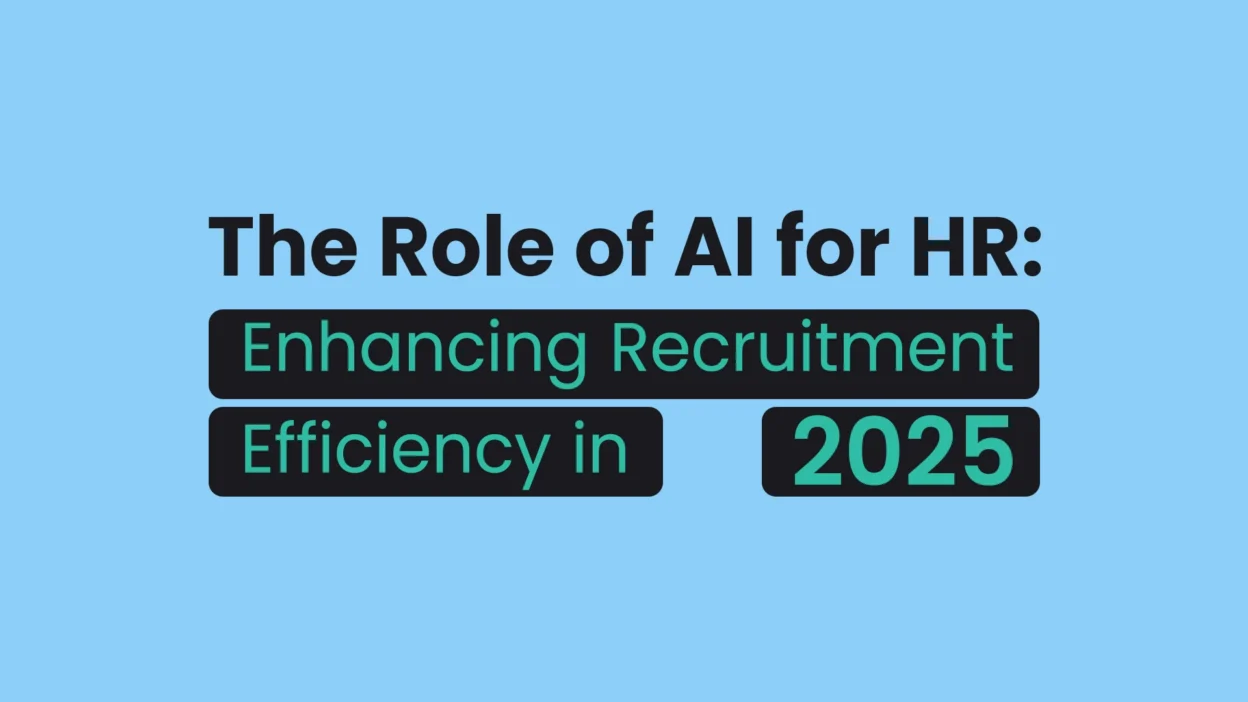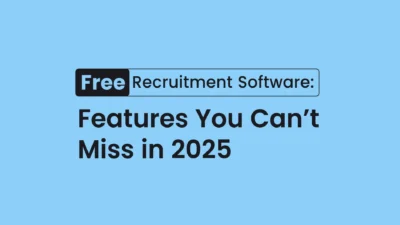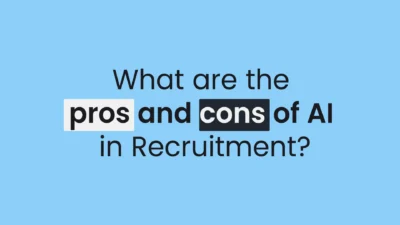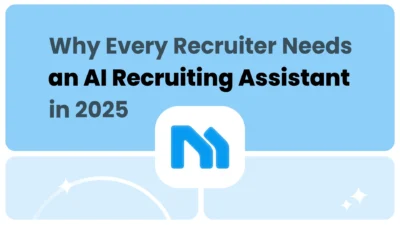Using AI in most of the industries has transformed the old processes and HR (Human Resources) can no longer be an exception. AI is changing the recruiting process to make it more efficient. It is helping companies to attract, monitor, and retain talents easier. With all the information, it seems that 2025 is going to be a revolutionizing year for HR teams.
More processes are going to be automated with the help of Ai for hr and the role of data is more important than any other time.
Table of Contents
How AI Can Be Used in HR?
AI for HR covers a wide range of tasks, from talent acquisition and onboarding automation to employee engagement. Here’s how AI is shaping HR management:
1. Automated Resume Screening
The landscape of Human Resources is evolving rapidly, and artificial intelligence is leading this transformation. Take resume parser and screening, for instance. HR teams no longer need to spend countless hours reviewing applications manually. Modern applicant tracking systems now efficiently analyze thousands of resumes, examining everything from career trajectories to specific competencies, making hiring significantly more efficient.
2. Enhanced Candidate Sourcing
Rather than relying solely on traditional job postings, HR departments now use AI-powered tools that actively search for ideal candidates. These intelligent systems scan professional networks, job boards, and social media platforms to identify talented professionals who align perfectly with role requirements – including those who might not be actively seeking new opportunities.
3. Chatbots for Initial Screening
Interactive chatbots have become invaluable in the initial screening process. These AI assistants engage with candidates through preliminary conversations, asking relevant questions to assess qualifications. This innovation allows HR professionals to focus their energy on evaluating the most promising candidates.
4. Predictive Analytics for Hiring Decisions
AI for hr has introduced predictive analytics to the hiring process. Perhaps Machine learning in HR management is the most impressive function that is being taken care of by AI. By analyzing previous data about employee performance, retention, and success patterns, these systems help HR teams make more informed hiring decisions. This data-driven approach not only improves the quality of hires but also contributes to building more stable teams.
5. Bias Reduction in Hiring
One of the most significant advantages of Artificial Intelligence in Human Resources is its ability to be fair in hiring. While humans naturally have some unconscious biases, ai for hr evaluates resumes purely on their abilities and potential. With these data-driven decisions, organizations can build more diverse and inclusive teams and bring talents with fresh perspectives to the workplace.
6. Employee Engagement and Retention
AI’s impact extends well beyond the hiring process. Modern HR teams now use sophisticated tools to understand and enhance employee satisfaction. These systems analyze various forms of feedback and communication, helping organizations identify trends in employee sentiment. This valuable insight enables HR teams to develop targeted strategies that keep valuable team members engaged and fulfilled in their roles.
7. Automating Repetitive HR Tasks
The administrative burden of HR has always been a lot, but AI is changing this. Ai In Recruitment handles many time-consuming tasks automatically, from onboarding a new team member to managing compensations.
HR automation with AI for HR helps employees quickly access information about company policies, benefits, and professional development opportunities, allowing HR professionals to focus on more strategic actions. Additionally, our innovative LinkedIn Profile Scraper further streamlines candidate sourcing and recruitment by automatically gathering comprehensive candidate profiles.
8. Performance Management and Learning & Development
Perhaps one of the most exciting applications of ai for hr is in employee development. Modern performance management systems provide continuous feedback. This will help team members grow in real time rather than waiting for annual reviews. Additionally, learning platforms that are AI based create customized development paths. They suggest relevant training and growth opportunities based on each employee’s unique career goal and skill gaps.
Is AI Replacing HR?
Let’s address the elephant in the room: there is a lot of concern about AI replacing HR professionals. But here is the thing: ai for hr isn’t here to take over HR; it’s here to make HR better at what it does best which means “working with people”.
LinkedIn Profile Scraper - Profile Data
Discover everything you need to know about LinkedIn Profile Scraper , including its features, benefits, and the different options available to help you extract valuable professional data efficiently.
Why We Still Need the Human Touch
No matter how smart ai for hr becomes, it can not replace human understanding and intuition. Sure, ai for hr is fantastic at calculating numbers and finding out the patterns, but it is not able to read between the lines of a conversation or highlight the cues that tell us someone would be perfect for a role. That is where we need HR professionals (the human ones.)
When was the last time you wanted to discuss a sensitive workplace issue with a chatbot? You may not want to do that regularly! HR experts bring essential human qualities to the table. They present empathy, cultural understanding, and the ability to solve complex workplace issues. These aren’t just some skills that are nice for an HR person to have. They are fundamentals to creating a healthy work environment.
Read More: What are Ats Friendly Resume Template?
AI: The Perfect Assistant, Not the Boss
Let us say a better way to think about ai for hr is like having an efficient assistant who handles all the time-taking paperwork and data analysis. While AI provides valuable insights and handles routine tasks, HR leaders are the ones who make the final decisions on important matters. They understand the hints in team dynamics and company culture in ways that Artificial Intelligence simply can not.
Moreover, there is the whole ethical side of issues. HR professionals play a crucial role in ensuring fair practices and keeping an eye on AI systems to prevent any unintended biases. They’re the guardians of workplace ethics, if you will.
The Personal Touch in Professional Growth
When it comes to career development, nothing can compete with human guidance. Of course ai for hr can suggest training programs and identify skill gaps but it can not sit down with you and talk to you about your career goals or help you find out about office politics. That kind of mentorship and personal guidance? That is purely a human boundary.
Looking Ahead: The Future of HR
As we move through 2025, it is becoming clear that the real magic happens when we combine AI’s efficiency with human expertise. Organizations that get this balance right are the ones pulling ahead in attracting and keeping top talent.
The bottom line? The future of HR is not about choosing between technology and human touch. It is about bringing them together to create better workplaces. As our tools get smarter, the human element in HR becomes more valuable, not less. After all, business is still about people.
Remember that ai for hr is transforming HR for the better, but it’s the human touch that turns a good workplace into a great one. The future of HR lies in this perfect partnership between artificial intelligence and human wisdom.
FAQs About AI for HR
1. How does AI improve the hiring process?
AI enhances recruitment by automating resume screening, conducting initial interviews via chatbots, and using predictive analytics to identify top candidates. This streamlines hiring and ensures better talent acquisition.
2. Can AI remove bias in hiring?
Yes, AI reduces unconscious biases by evaluating candidates based on objective data rather than personal opinions. However, AI models must be carefully designed to avoid biased training data.
3. What are the benefits of using AI in HR?
AI improves efficiency, enhances decision-making, reduces administrative tasks, increases employee engagement, and helps HR teams focus on strategic initiatives.
4. Will AI completely replace HR jobs?
No, AI is a tool that supports HR professionals rather than replaces them. HR roles require human judgment, emotional intelligence, and ethical considerations that AI cannot provide.
5. How can small businesses use AI for HR?
Small businesses can leverage AI-powered HR software for recruitment, employee onboarding, performance management, and payroll automation. Many AI tools offer scalable solutions suitable for smaller teams.
6. What are the challenges of implementing AI in HR?
Challenges include data privacy concerns, resistance to change, potential biases in AI algorithms, and the need for continuous monitoring to ensure AI-driven decisions align with company values.
7. Is AI in HR expensive?
AI-powered HR solutions vary in cost, but many affordable options cater to businesses of all sizes. The long-term efficiency gains and cost savings outweigh the initial investment.





